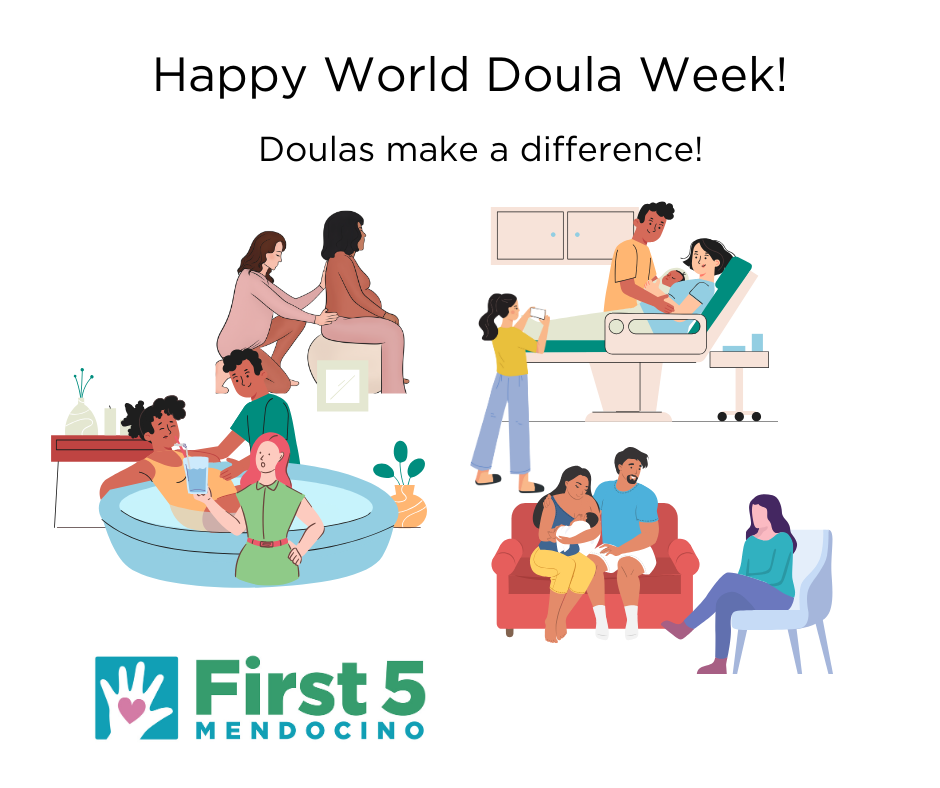Strong Starts – World Doula Week 2024

We are big fans of doulas. There are more than a few reasons why. On our team, we have personal experience having doulas attend our own births and some of us even trained and worked as doulas.
There’s also the science. It tells us doulas help families come out stronger.
What’s a doula?
Centered around the birthing family, doulas are important partners in the birth care team, along with nurses, midwives, and doctors.
Here’s a little bit of what doulas do:
- visit for an hour or longer during most prenatal doula visits to
- share information about birth choices.
- prepare you for birth.
- join you and stay with your during labor until your baby is born.
- help parents with comfort and movement.
- encourage birthing person with their goals.
- amplify parent voice in birth.
- stay an hour or 2 after the birth supporting your family.
- visit for an hour or longer during most postpartum doula visits.
- help with baby care and questions.
- listen to your thoughts and process emotions.
- and more.
Doulas and the Birth Team
Some people don’t realize this- that doulas are not health care providers. They are helpers! Doulas focus on care, support, and advocacy. And they are important part of the birth team!
Doulas share hours together with families during pregnancy. They stay with families through the whole labor while nurses, midwives and doctors in the hospital usually must divide time between families to ensure everyone gets the care they need. Doulas do not take the place of a healthcare provider but add to the team.
Doulas usually continue seeing families after the birth while families adjust and learn to parent a newborn. They give tips on baby care, breastfeeding, and support around the home. Babies still see their health care provider. And parents see their providers too.
Visiting with your doula adds to the experience. It helps parents and babies get off to their best start. They’ll knows your birth preferences; can stand by you from pregnancy through postpartum; and answer your calls in between visits.
What are the differences between doulas and healthcare providers?
Health care providers can include nurses, midwives, doctors, and others. They do the medical work of birth and pregnancy- like monitoring vital signs and growth, educating families to support healthy lifestyles, ordering tests, and recognizing, diagnosing, and treating health issues. This is essential for healthy births and so appreciated! But our hospital-based nurses, midwives, and doctors can’t typically focus on one birthing family through the entire labor process. Normally, nurses spend about 10% of their time with laboring families during active labor. This can surprise families.
Doulas generally spend the whole labor with families they work with. Because of the ongoing relationship between a birthing family and their doula, parents have more satisfying births and less need for intervention. Doulas rub backs, hold hands, grab water and snacks, help with breathing, and other comfort techniques. They guide, listen, and share information.
Community Doulas
In Mendocino, there are at least 10 practicing doulas. Last year a new Medi-Cal Doula benefit took effect. It covers doula support which can include:
- Labor support
- A combination of 11 prenatal and postpartum visits to help families
- adjust to pregnancy
- prepare for birth
- and support early parenthood
So far, 3 doulas are approved Medi-Cal doulas in Mendocino. Several more doulas are finishing the process. We’ll be adding more information to our website to help you connect with doulas.
Doula Diversity
Supporting new doulas from different backgrounds helps us strengthen families. Not everyone has the same birth outcomes. Indigenous, Black, and other people of color (BIPOC) experience racism and bias and other obstacles in life that can lead to worse birth outcomes. But having a doula from a similar background can help. For instance-
Jenna Kunze and Jessica Lázaro Moss in The Rise of Indigenous Doulas“By intimately understanding the community they serve, Indigenous doulas are able to build trusting relationships with clients that assuages the buildup of toxic stress.”
So, part of the solution is representation in our care systems. Mendocino’s doula community is off to a good start. There are several bilingual Latina and at least one Indigenous Doulas supporting births in the community so far. And we’re working to build more representation in the doula workforce. First 5 is hosting an Indigenous Doula training April 30th through May 3rd as part of our commitment to equity. You can learn more here.
Kicking off World Doula Week
First 5 Mendocino hosted the 2nd meeting of Mendocino Doulas to bring doulas together to build the Mendocino Doula Hub. The Hub will connect pregnant families to doulas. It will provide a space for doulas to meet, connect, grow, and collaborate together and with the healthcare system.
Want to know more?
First, remember to follow us on Facebook and Instagram!
Parents, take a peek at our doula resource list. We’ll be adding more information to our website, too.
If you are a doula and want to connect, get in touch with us at First 5 Mendocino at 707-462-4453 or email alex@first5mendo.org
Health care providers, if you want to learn more about doulas, how they support the birth team, and how to integrate doula support based on the evidence and advice from the California Department of Health Care Services, American College of Obstetricians, and California Maternity Quality Care Collaborative, feel free to reach us at 707-462-4453 or email at alex@first5mendo.org.
Background
We haven’t specifically cited much, but we’ve talked about the science that backs the needs and benefits of doula support. If you would like more background, please reach out and we’ll share more references for those of you who want to explore the science and some of the thinking on improving maternity care.

